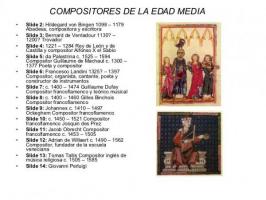Most outstanding COMPOSERS of musical ROMANTICISM

Image: Slideshare
Human beings go through various periods in history. As we move forward, we discover, we create, we reinvent ourselves and the world around us. After all, creativity is a quality and a power that is born out of curiosity and the need to express ourselves through our own creations. Little by little we are more owners of our actions and we are more aware of our creative power.
Music has existed in parallel with exceptional characters who have been in charge of raising knowledge and breaking the limits of convention, custom and tradition to set new trends. In this article by a PROFESSOR we will learn about the musical romanticism: most prominent composers.
More than an era, the romanticismrepresents a series of ideas and trends, specifically in art, since it is a cultural movement. This movement developed primarily in Europe during the 19th century and the first decades of the 20th century.
Romanticism acquires much more importance and strength when we contrast it with the ideas of its earlier times: the enlightenment and neoclassicism. These were streams focused primarily on the intellect and knowledge as a refined source of power. For this reason they were closely related to politics and the social aspect.
In response, romanticism arises that, in a contrary way, gives the utmost importance to personal and individual expression, interpretation of reality and with it the contemplation of life and nature. The main focus in romantic culture is the search for the expression of the feelings and the conception of existence.

Image: Slideshare
Romanticism gave music one of the greatest gifts: freedom of creation. Since in earlier times artistic creation was tied to the patronage of the nobility or to qualities functional as the liturgy, music was always limited within certain parameters to social service or third parties. It is for the first time at this time that music has individual freedom of expression, this would give them composers the opportunity to experiment by breaking the norms of music traditional.
With the gap wide open, the romantic artists eagerly sought the originality, trying to get rid of musical customs. Economically there was also a notable impact, since the musician began to have direct contact with the popular market. Musicians being able to create their own works and dispose of them as they liked, could choose to have their works published to be available to the public. public and in the homes of the middle class, representing an important new source of money and thus giving them greater economic and artistic independence. For the first time, the musician could choose stand up for yourself and be recognized on his own merits.



